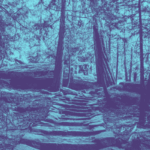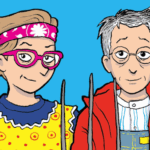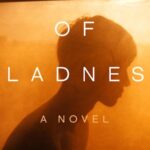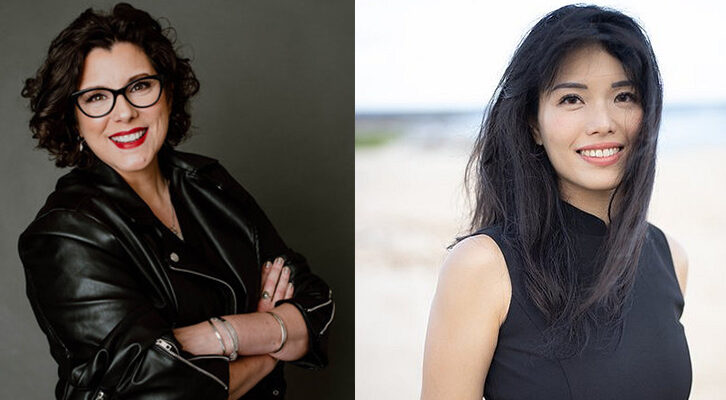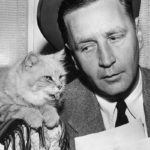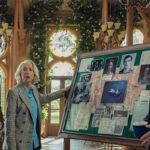Emma Donoghue and Laird Hunt on Writing Historical Women
Grandmothers, Deep-Sea Diving Suits, and Peat Fires
Laird Hunt’s new book, The Evening Road, is recently out from Little, Brown. Emma Donoghue’s latest is The Wonder.
Emma Donoghue: I know how I started my habit of writing about women from the past—either famous ones who’ve slipped into obscurity, or the kind of nobodies who never left enough textual trace to make it into capital-H History. It all began (I’m a little embarrassed to admit this) with my PhD, which was on 18th-century fiction and included lots of reading about social conditions in pre-modern Britain. All that fascinating muck and stink, combined with the heady intellectual atmosphere of feminism and revisionism more broadly in 1990s Cambridge grad-student circles, led me straight to my first historical novel, Slammerkin. I was burning to give a voice to sex workers and maids and slaves. Nowadays it seems self-evident that there’s a big readership for novels about people (and women particularly) who’ve been underrepresented in traditional history, but in the late 1990s that wasn’t true at all. I published the novel in 2000 with great difficulty—my agent despaired of selling a historical novel (the genre seemed so uncool), my then-publishers on both sides of the Atlantic dropped me, and it took a lot of scrabbling around before new ones took me on. But then Slammerkin sold better than anything I’d written before. So for me, ransacking the past for odd women (whether real ones or fictional equivalents) has been crucial to my career. As well as being endlessly interesting to me, of course, which is more important.
What about you?
Laird Hunt: It really all started for me when I was spending a lot of time in my Indiana grandmother’s library after having washed up on her shores as a teenager. I didn’t do any writing to speak of during the years I lived with said grandmother, and I didn’t even read any of the Wolfe and Woolf and Faulkner and Joyce and Homer and Ovid and even William Gaddis she had on her shelves until long afterward. But I did sit in that library with my own books—which tended toward things like Tarzan, Lord help us. And my grandmother, who was five feet of grit and fire with a master’s degree, did often come and stand in the doorway and tell me family stories as I read, or tried to read. So reading and history and fierce women got mashed up in my head. Didn’t mean when it came to it years later I thought it was okay to write about it. That took time.
I don’t mean to imply that I spent years thinking “I want to write about women in history” while telling myself I couldn’t or shouldn’t. It was never so clearly articulated. It’s just that when the narrator of the first novel where I did it in earnest, Kind One, started shout-whispering in my ear, my whole brain hurt with something that felt like deep recognition—and I had to respond. I haven’t turned my back on the kind of writing I was largely doing before I started on these books about women, which are set in the past, but once you get going with something that feels true, it can be oh so hard to stop. About as hard as it was for my grandmother to stop talking to me when I was trying to see where Tarzan would swing next. I’m so glad she never did.
How about you? Any tutelary (or not) ass-kickers connected to this endeavor in your background? And then how do the books start for you? More specifically, how do, say, Blanche and Jenny or Lib and Anna rise up out of the ether of history and imagination to take up residence in your head and then on your pages?
ED: Neither of us would have thought of it as ass-kicking, but my mother (a schoolteacher—English and career guidance) did regularly take me poking around old graveyards and through the kitchens of “stately homes,” as well as telling me about an aunt with a peg leg and so forth. I’d say she sparked in me an interest in the history of real, (extra)ordinary people—the nitty-gritties. For me, the books (at least the historical ones) tend to begin when I come across some factual incident that’s a puzzle—often, though not necessarily, a crime—and that involves such interesting political and psychological forces that it’ll take the length of a novel to begin to explain. For instance, with my first one, Slammerkin, I was answering the question, why would a 1760s servant have killed her employer, then confess that she did it for “fine clothes”? My most recent novel, The Wonder, is fictional, but so steeped in the specifics of mid-19th-century Ireland, and inspired in so many ways by dozens of real “fasting girls” cases, that it sits closely beside my fact-based fictions. What makes the characters rise up, as you say, is that I immerse myself so much in the details of the way they lived that I start to think the way they may have done. I have to do too much research—or rather, no amount is too much—and then of course most of it won’t show up on the page, but what does show up is enriched by that unseen compost of knowledge. In my experience getting the mind-set of the times right is even more important than the costumes, though sometimes the costumes (I’m thinking of an 18th-century corset, say, which feels like an armored breastplate) are a clue to the mind-set.
I’d love more specifics about how you came to be hooked by each of your women-in-the-past novels.
LH: My grandmother was an English and Latin high school teacher! And I should probably say that at the time she was much more likely to brag to someone about me (it didn’t take much) than to set me straight, but the aftershocks of my time with her have been highly, let’s say, motivating.
At any rate: “ . . . that unseen compost of knowledge.” I love this idea. And I think it gets at why a book like The Wonder works such a powerful spell on me. It is layered, textured, fully realized, and yet it wears its elaborate wimple, if you will, with energizing lightness. We see this gone world and we smell it, and I’m sure now that if I ever taste something that has been cooked on a peat fire I’ll know it right away, but you don’t go full hobnail boot on us: give us every stitch and button. It’s generous but also just the right amount to slip us over the edge into belief.
I did an onstage interview last year with the writer Jennifer Egan, and she was telling us about the book she is working on, set in the past, in Brooklyn. As part of her research she put on, or maybe I mean climbed into or had lowered onto her, a deep-sea diving suit. She didn’t go into the water, I don’t believe, but she had it on and felt its weight, the hard-to-bear heft and heat of the thing. That corset you mention made me think of it, and also about the inverted corset Loreta Velazquez, one of the women I read up on as I researched Neverhome, had constructed to hide her curves when she put on the uniform and went to war. She also had false mustaches made, and while I’ve never been inside anything like her whalebone exoskeleton, I have had some of those on. What a flimsy thing to try to fool the world with!
It’s fascinating what will get one to take a second look, have a deeper think, set off on these crazy long journeys that novels are. With The Evening Road, the start was hearing an old woman, near the end of her life, describing a day in her relative youth when her boss told her to grab her things—they were going to jump in his car and go to the lynching that was fixing to happen over in Marion, Indiana. It was part of a radio program on the 80th anniversary of the lynching that gave rise to the song “Strange Fruit.” What took me straightaway was how this woman clearly recognized that having gone along as if to a festival was wrong, but she was also not entirely sorry to have done it, either. It was just something everyone was doing that day. That moral ambiguity, which often crawls up out of some form of manifest ambivalence like this retired secretary’s, has fueled all three of these books, as well as a fourth one in progress that turns around witches in early America.
In Kind One, a woman is both mistress and enslaved over the course of the novel, and her voice (that shout-whispering one) is both defiant and racked by guilt as she describes what happened. Neverhome is a book-length confession. Its narrator, Constance “Ash” Thompson, has done something she feels terrible about, and we slowly realize, at least that is my hope, that she has been telling this story of going to war in disguise not to regale us with a tale of unusual adventure but because she needs to come clean: to the page, to us, to herself. I should say that, with the exception of Neverhome, when I think I have finished, that the story has been taken as far as I think it can be, another voice steps in. For example, Ottie Lee in The Evening Road was the whole shebang for a couple of years, and then one bright morning Calla Destry stood up and said, “Ahem.”
I mentioned Jennifer Egan above, and as I’ve been writing, I’ve remembered that I wanted to ask you about Clare Clark and Sarah Waters, both writers I have read with great admiration over the years, who are terrifically adept, in ways that feel distinct but also not too distant from your own, at setting past worlds to vividly, pungently shimmering before our eyes. I don’t mean to presume that you yourself feel an affinity, if you will pardon me, between your work and theirs, but I would love to know what other contemporary writers of historical fiction, whether women are placed at the center or their work or not, have been important to you.
ED: That moral ambiguity is one of the things I find most exciting in The Evening Road. It’s so risky to offer moral ambiguity and even humor in a book about a lynching, without taking the events in any way less than seriously.
Loreta Velazquez’s curves-hiding corset reminds me of the one time I’ve cross-dressed, for a New Year’s Eve trip to the pub back in my student days. As soon as I’d tucked a long, thick carrot in my trousers and mascaraed in a mustache, I began to behave with an awful leering swagger. So really what the experience taught me was how stereotyped my sense of manhood was. Nowadays I so enjoy the times when I write from a man’s point of view, because I’m getting to inhabit a body and experience particularly unlike my own, I suppose.
Sarah Waters—I’ve been a huge fan of hers from the start. What a plotter! And how can her stories be so meta—so obviously playing with the tropes of nineteenth-century fiction—and simultaneously so credible? I don’t know Clare Clark but I’ll seek her out now. Some of the writers of historical fiction that have taught me most are Hilary Mantel, Julian Barnes, Michel Faber, Ann-Marie MacDonald, the late, great Diana Norman, and Barry Unsworth . . . There was a key moment in the eighties when writers I admired like Margaret Atwood or Jeanette Winterson suddenly produced a one-off historical novel, as if to say, “Why stick to our own time?,” and I think that really helped break down the walls of the genre. Actually, I really don’t see novels set in the past as a distinct genre at all—just an authorial decision. But I should also admit that my early favorites were on the bodice-ripping side (Jean Plaidy, Kathleen Winsor’s Forever Amber), and that probably left its greasy thumbprint on me, too.
My dad [the literary critic Denis Donoghue] likes to bait me by quoting Henry James on historical fiction being “humbug.” And I remember being even more irritated by a comment of Irvine Welsh’s about it being a cop-out to write anything other than stories of your own moment. Yes, trying to write the past into life will always be in some sense an impossible task, but I find it a thrilling and even rather heroic one.
LH: How marvelous to have a father who baits you with Henry James! Even if it is that old bit where he gives Sarah Orne Jewett the big thumbs-down on historical fiction. I’ve always figured it was all but impossible to know/feel/intuit enough to write about one’s own time with the kind of adequacy that James would seem to be asking for, so why the hell not write about the past. Tony Horwitz has this great sentiment in an article for the New York Times called “The 150-Year War” that gets at some of why the past—and this is true even when I’m writing about the present—calls so loudly to me: “It’s a bottomless treasure, this Civil War, much of it encrusted in myth or still unexplored. Which is why, a century and a half later, it still claims our attention and remembrance.” Swap out the event and change the amount of time galloped by and it becomes a useful general proposition. What Mantel, whom you mention, has done in the amazing Cromwell books is a shining example of the kind of reinvestigation or crust-stripping, from the outside in and the inside out, that the best historical fiction can offer.
Speaking of crust, I read recently that archeologists were taking core samples from what used to be the gigantic Fresh Kills landfill on Staten Island, and will soon be a very big park, and pulling up things like perfectly preserved hot dogs from half a century ago. I love the way that rummaging around in the past offers up the poignant and, depending on how you see it, the absurd. I wonder whose hot dog it was? Why it was thrown away uneaten? And did it come up from the dark with ketchup or mustard or both on it? I learned recently that my great-uncle once served as Amelia Earhart’s projectionist. In the same conversation, with my own father, I learned that my great-great-aunt owned shares in Wrigley’s chewing gum. I can’t tell you what I’m going to do with either of these, not to mention with that hot dog, but, magpie-like, I line my nest.
ED: I have very few repeat-worthy family stories, and none that could spark a novel. In one of my books I used an anecdote about my great-grandfather the drunken boatman who drowned a whole tour party of Americans . . . but that’s turned out to be one of family lore’s fictions: didn’t happen. So I envy you your great-uncle! And I really envy some writers (I’m thinking of Ireland’s Sebastian Barry, say) whose family histories seem as rich a source for novels and plays as the Fresh Kills landfill may prove to be.
Writers like Hilary Mantel are the best answer to those who sneer at historical fiction as escapism/cheap shudders. When I read her utterly credible version of Henry VIII’s tyrannical madness, I think: this stuff is urgent and important, more than ever in the age of Trump. In the context of the ongoing battle over flags and statues and names in the South, for instance—I’m thinking of Rebecca Solnit’s brilliant recent piece in Harper’s—The Evening Road, with its beautiful, painful probing of the landscape of a lynching, couldn’t be more timely.
Not that I think we need to justify setting novels in the past by offering them as commentary on today. It’s just that if you write about stuff that really matters, rooted in its era, it’ll probably matter just as much now. Because none of the really big debates can ever be said to be over.
LH: Not very long ago, in an article for the New Yorker on J. D. Salinger and a movie of one of his works that didn’t get made, the historian Jill Lepore wrote, “Everyone has a labyrinth. History is mine.” Well, mine, too. Of course there are the labyrinths you are lost in (my daughter and I just saw Kubrick’s The Shining) and the ones you look at, and when fiction about the past is working well it’s both those things at once: you are in it (maybe in a brothel in nineteenth-century San Francisco) and out of it (maybe reaching for another handful of corn chips or answering a text or tucking the kid in). Both states of being feed the fiction getting built. And I am talking here about writing works set in the past as well as reading them.
It has been very strange, and then stranger, and then downright chilling, to have this novel I wrote about 1930 come to seem like a novel written about 2017, but there is no dodging it. Hate slogans spray-painted on walls and bridges in the wake of the recent U.S. election are in every way identical to the sort of monstrous expression that was widely on display on that terrible day in east-central Indiana when two young black men were lynched by a white mob and a third was terrorized and beaten within an inch of his life. I also know that there is kindness and generosity and grace at work here still in spite of everything. Not to mention all those living now as then in the hot, messy middle: the bracket my characters—like their creator—tend to come from.
You say it perfectly, no surprise: “none of the really big debates can ever be said to be over.” The U.S., and so much of the world, is absolutely boiling over at the moment with these debates that aren’t anywhere close to being finished. There is a lot to sort out, a lot to address and to account for.






